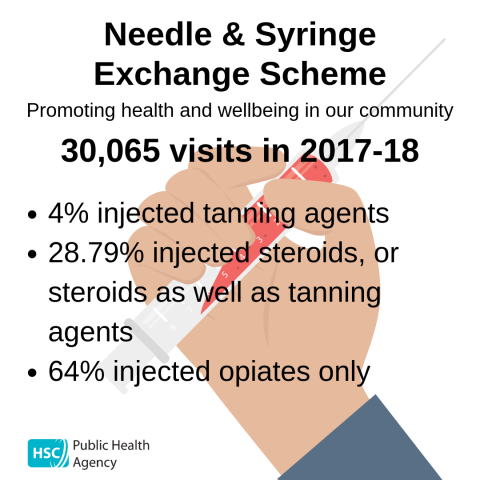Needle exchanges supporting health and wellbeing in our community

Needle and syringe exchange schemes (NSES) are supporting the health and wellbeing of our whole community and provide those who inject substances with direct access to a health professional, who can help them in engaging with treatment services to address their drug misuse.
That’s is one the key messages from the Public Health Agency (PHA) and the Health and Social Care Board in their 2017/18 NSES annual report.
The publication details the number of visits to the 21 NSES services that participated in the PHA-funded scheme for the period 1 April 2017 and 31 March 2018.
A total of 30,065 visits were made to exchange needles and syringes, an increase in demand of 782 visits (3%) from 2016/17, demonstrating a need for the scheme and good use of the service, which helps protect the wider community.
The PHA’s Drug and Alcohol Lead, Michael Owen, said: “During this period, 21 needle exchange services were offered, two more than the previous year, enabling the PHA to help more people dispose of drug-injecting equipment safely, and so we would expect to see a rise in the overall number of visits across the NSES.
“Needle exchange services are based in areas where there is an existing pattern of people who inject, but they benefit the entire community, not only by providing a place for injecting equipment to be safely disposed of and reducing the risk of drug-related litter, but also lowering the risk of diseases such as HIV and Hepatitis B and C within the wider population.
“For those who use the confidential service, the NSES provides them with direct access to a health professional, who can support them in engaging with treatment services to address their substance misuse.”
Anyone who injects substances can use a needle exchange service, and this includes people who inject substances such as performance enhancement steroids, tanning agents, stimulants and opioids.
Of the total visits to the NSES, 4% injected tanning agent only; 28.79% injected steroids, or steroids as well as tanning agent and opiates; and 64% injected opiates only.
The report shows that the Belfast Health and Social Care Trust area had the highest number of visits while the Southern Trust area had the lowest number of visits.
Michael Owen continued: “Providing services locally is vital, as people who inject substances are often vulnerable, may be in poor health, dealing with complex social issues and without local access to sterile equipment and advice. Needle exchanges are particularly valuable for engaging these people, because it may be the only service they are willing to use.
“The vast majority of people who inject substances – which includes people who inject steroids, tanning agents, opioids and stimulants – will find a way to inject it whether they can get clean needles or not. There is a serious risk to population health if these individuals share or reuse injecting equipment, which can lead to serious illness and infection.
“Making it harder for people to get clean needles would mean they are far more likely to share needles. This would hugely increase the risk of blood-borne viruses such as Hepatitis B and C or HIV amongst the injecting population, and this in turn would increase the risk to the wider population, so needle exchanges have an important role to play in helping to protect not only drug users, but also the community more generally.”
If you or someone you know is affected by drug and/or alcohol misuse, a range of support services in your local area can be found onwww.drugsandalcoholni.info
The full NSES report can be found at Annual Report Needle and Syringe Exchange Scheme 2017/18.
